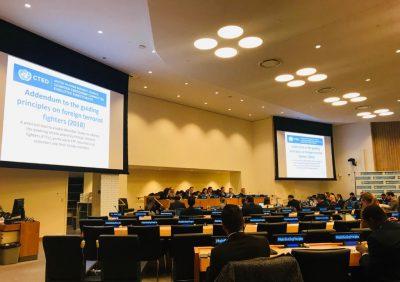
In order to raise awareness and strengthen the understanding of the Addendum to the Madrid Guiding Principles, the United Nations Security Council Counter-Terrorism Committee (CTC) held an open briefing in New York on this theme on 22 February 2019. A practical tool to assist Member States in stemming the flow of foreign terrorist fighters (FTFs), the Madrid Guiding Principles were identified at a Special meeting of the Committee held in Madrid in July 2015. In light of important developments since, including the adoption by the Security Council of its resolution 2396 (2017) that focuses on returning and relocating FTFs, the Committee saw a need to update these principles – and did so in December 2018.
“While several of the world’s deadliest terrorist organizations, including ISIL, have been weakened, and the number of FTFs returning and relocating is lower than expected, the threat they pose can at any time be exacerbated by a number of persistent factors. Returning and relocating FTFs could spread the threat of terrorism to new territories and increase conflicts. The release of convicted FTFs from prison may also continue to present long-term challenges. Family members accompanying or associated with FTFs, including women and children, may also require long-term rehabilitation and reintegration assistance. Although Member States have made progress in addressing these challenges, many of the conditions that were conducive to the emergence of the FTF phenomenon remain in place,” said H.E. Gustavo Meza-Cuadra, Ambassador and Permanent Representative of Peru to the United Nations and Chair of the Counter-Terrorism Committee. “Continued implementation of the Madrid Guiding Principles and the Addendum could play a significant role in addressing these threats,” he added.
The open briefing was well attended.
The open briefing touched on the need to address radicalization and recruitment to terrorism, including through risk-assessment tools, and intervention and prison programmes. These are areas new to Member States and to which the Addendum offers specific and much-needed guidance. There are also Guiding Principles related to children and children’s rights in several areas, including watchlists & databases, biometric identification, and prosecution, rehabilitation, and reintegration (PRR) strategies.
“The Madrid Guiding Principles and the Addendum contain detailed and specific guidance to ensure that the relevant tools and strategies are deployed and implemented in a manner that is compliant with domestic law and international obligations,” said Assistant Secretary-General, Executive Director of the Counter-Terrorism Committee Executive Directorate (CTED) Michèle Coninsx.
The Addendum, which contains 17 new Guiding Principles in addition to the 35 contained in the document agreed to in Madrid, is available in all UN languages and can be accessed here.
Additional information:
Agenda for the open briefing.
CTED PowerPoint presentation on 2018 Addendum to the guiding principles on foreign terrorist fighters. Download
More photos from the meeting can be found on CTED’s Flickr.

